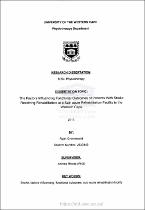| dc.contributor.advisor | Rhoda, Anthea | |
| dc.contributor.author | Groenewald, Ryan | |
| dc.date.accessioned | 2022-11-02T08:38:07Z | |
| dc.date.available | 2022-11-02T08:38:07Z | |
| dc.date.issued | 2013 | |
| dc.identifier.uri | http://hdl.handle.net/11394/9401 | |
| dc.description | Masters of Science | en_US |
| dc.description.abstract | BACKGROUND
A great deal is known about stroke and its impact in high-income, developed countries, however this is not the case in developing countries, such as Sub-Saharan Africa. Stroke has been identified to be a major non-communicable disease (NCDs) reaching epidemic proportions in low-income, developing regions of the world. The estimates in the WHO global burden of disease update of 2004 places the burden from NCDs in South Africa as two to three times higher than that in developed countries. The rising of NCDs in South Africa, which mostly affects the quality of life of the working-age population and increases the healthcare expenses both at a personal and countrywide level, impacts on the workforce and productivity of the country. There is much research regarding the factors influencing functional outcomes of individuals following a stroke at tertiary level or specialised rehabilitation institutions elsewhere in the world, where patients received intensive rehabilitation, however here in the South African public sector, where there are limited resources for intensive rehabilitation, only a few studies could be identified. lnsufficient knowledge of the factors influencing functional outcome following a stroke in the South African
context impacts negatively on the rehabilitation offered, as well as the rehabilitation programmes drawn up for the patients, as goal directed/focused treatment is based on guess work rather than evidence-based best practice. Two factors, that have not been widely researched, but that have the potential to have a positive influence on functional outcome following a stroke are: 1) a family support network and 2) patient satisfaction. Limited literature is available on the family support network's relationship with functional outcomes and no literature could be identified on the patient's satisfaction in this regard. | en_US |
| dc.language.iso | en | en_US |
| dc.publisher | University of the Western Cape | en_US |
| dc.subject | Stroke | en_US |
| dc.subject | Factors influencing | en_US |
| dc.subject | Functional outcomes | en_US |
| dc.subject | Sub-acute rehabilitation facility | en_US |
| dc.subject | World Health Organisation (WHO) | en_US |
| dc.subject | lnternational Classification of Functioning, Disability and Health (lCF) | en_US |
| dc.subject | Western Cape Department of Health's (WCDOH) | en_US |
| dc.title | The Factors lnfluencing Functional Outcomes of Patients With Stroke Receiving Rehabilitation at a Sub-acute Rehabilitation Facility in the Western Cape | en_US |
| dc.rights.holder | University of the Western Cape | en_US |

